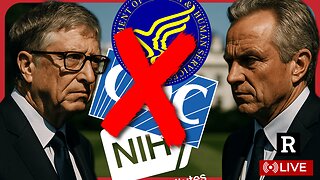Premium Only Content

We The Sheeple People of The United States of America and A Real Bill of State Rights
The Second Amendment Is Not Gun Control: Second Amendment Doesn’t Give Americans The “Right to bear Arms” It Prohibits the Government from ‘Disarming The People’. The Second Amendment doesn’t give Americans the “Right to bear Arms.” The 2nd Amendment” is supposed to “Prohibit the Government” from taking our Arms and ‘Disarming The People’.
It’s a protection from a possible Tyrannical Government!
There are two versions of the text of the Second Amendment, each with slight capitalization and punctuation differences, found in the official documents surrounding the adoption of the Bill of Rights. One version was passed by the Congress, while another is found in the copies distributed to the States and then ratified by them.
As passed by the Congress:
A well regulated Militia, being necessary to the security of a free State, the right of the people to keep and bear Arms, shall not be infringed.
As ratified by the States and authenticated by Thomas Jefferson, Secretary of State:
A well regulated militia being necessary to the security of a free state, the right of the people to keep and bear arms shall not be infringed.
U.S. Supreme Court: District of Columbia v. Heller (2008), “Right to bear Arms” is “clearly an individual right, having nothing whatsoever to do with service in the militia” and that it is a “Right” not to be disarmed by the Government and was not the granting of a new ‘right to have arms’.
“The Second Amendment is not about duck hunting….It is about our rights, all of our rights to be able to protect ourselves from ‘All Enemies Foreign and Domestic’. This includes protections from a possible Tyrannical Government.”
State Militia’s are completely separate from the Citizen’s Inherent Right ‘to bear Arms’.
The “Right to bear Arms” is not a State Issue, it’s a Federal Issue. No State Law can override the Federal United States Constitution.
The Preamble to The Bill of Rights
Congress of the United States
begun and held at the City of New-York, on
Wednesday the fourth of March, one thousand seven hundred and eighty nine.
THE Conventions of a number of the States, having at the time of their adopting the Constitution, expressed a desire, in order to prevent misconstruction or abuse of its powers, that further declaratory and restrictive clauses should be added: And as extending the ground of public confidence in the Government, will best ensure the beneficent ends of its institution.
RESOLVED by the Senate and House of Representatives of the United States of America, in Congress assembled, two thirds of both Houses concurring, that the following Articles be proposed to the Legislatures of the several States, as amendments to the Constitution of the United States, all, or any of which Articles, when ratified by three fourths of the said Legislatures, to be valid to all intents and purposes, as part of the said Constitution; viz.
ARTICLES in addition to, and Amendment of the Constitution of the United States of America, proposed by Congress, and ratified by the Legislatures of the several States, pursuant to the fifth Article of the original Constitution.
The Bill of Rights: A Transcription
The Preamble to The Bill of Rights
Congress of the United States
begun and held at the City of New-York, on
Wednesday the fourth of March, one thousand seven hundred and eighty nine.
THE Conventions of a number of the States, having at the time of their adopting the Constitution, expressed a desire, in order to prevent misconstruction or abuse of its powers, that further declaratory and restrictive clauses should be added: And as extending the ground of public confidence in the Government, will best ensure the beneficent ends of its institution.
RESOLVED by the Senate and House of Representatives of the United States of America, in Congress assembled, two thirds of both Houses concurring, that the following Articles be proposed to the Legislatures of the several States, as amendments to the Constitution of the United States, all, or any of which Articles, when ratified by three fourths of the said Legislatures, to be valid to all intents and purposes, as part of the said Constitution; viz.
ARTICLES in addition to, and Amendment of the Constitution of the United States of America, proposed by Congress, and ratified by the Legislatures of the several States, pursuant to the fifth Article of the original Constitution.
Note: The following text is a transcription of the first ten amendments to the Constitution in their original form. These amendments were ratified December 15, 1791, and form what is known as the “Bill of Rights.”
– Amendment I
Congress shall make no law respecting an establishment of religion, or prohibiting the free exercise thereof; or abridging the freedom of speech, or of the press; or the right of the people peaceably to assemble, and to petition the Government for a redress of grievances.
– Amendment II
A well regulated Militia, being necessary to the security of a free State, the right of the people to keep and bear Arms, shall not be infringed.
– Amendment III
No Soldier shall, in time of peace be quartered in any house, without the consent of the Owner, nor in time of war, but in a manner to be prescribed by law.
– Amendment IV
The right of the people to be secure in their persons, houses, papers, and effects, against unreasonable searches and seizures, shall not be violated, and no Warrants shall issue, but upon probable cause, supported by Oath or affirmation, and particularly describing the place to be searched, and the persons or things to be seized.
– Amendment V
No person shall be held to answer for a capital, or otherwise infamous crime, unless on a presentment or indictment of a Grand Jury, except in cases arising in the land or naval forces, or in the Militia, when in actual service in time of War or public danger; nor shall any person be subject for the same offence to be twice put in jeopardy of life or limb; nor shall be compelled in any criminal case to be a witness against himself, nor be deprived of life, liberty, or property, without due process of law; nor shall private property be taken for public use, without just compensation.
– Amendment VI
In all criminal prosecutions, the accused shall enjoy the right to a speedy and public trial, by an impartial jury of the State and district wherein the crime shall have been committed, which district shall have been previously ascertained by law, and to be informed of the nature and cause of the accusation; to be confronted with the witnesses against him; to have compulsory process for obtaining witnesses in his favor, and to have the Assistance of Counsel for his defence.
– Amendment VII
In Suits at common law, where the value in controversy shall exceed twenty dollars, the right of trial by jury shall be preserved, and no fact tried by a jury, shall be otherwise re-examined in any Court of the United States, than according to the rules of the common law.
– Amendment VIII
Excessive bail shall not be required, nor excessive fines imposed, nor cruel and unusual punishments inflicted.
– Amendment IX
The enumeration in the Constitution, of certain rights, shall not be construed to deny or disparage others retained by the people.
– Amendment X
The powers not delegated to the United States by the Constitution, nor prohibited by it to the States, are reserved to the States respectively, or to the people.
AMENDMENT XVI
Passed by Congress July 2, 1909. Ratified February 3, 1913.
Note: Article I, section 9, of the Constitution was modified by amendment 16.
The Congress shall have power to lay and collect taxes on incomes, from whatever source derived, without apportionment among the several States, and without regard to any census or enumeration.
ADMIN NOTE:
The Government does this Gun Control bit every year since 2009. And every year at least 10 million new guns are added to the 350 million we already have.
At the T.D.P., we don’t get it.
President Obama has been called the “Best Gun Salesman in America”. For some reason, we don’t think “Gun Control” is the ‘real’ issue.
It’s a great distraction and it causes division among the citizens.
We think the Government is secure in their knowledge of their ‘new’ crowd control devices, that we know about, and their “Frequency and Earthquake Weapons” they think we don’t know about.
We will be exploring their ‘new’ capabilities soon in greater detail.
Additional Text
The first 10 amendments to the Constitution make up the Bill of Rights. James Madison wrote the amendments, which list specific prohibitions on governmental power, in response to calls from several states for greater constitutional protection for individual liberties. For example, the Founders saw the ability to speak and worship freely as a natural right protected by the First Amendment. Congress is prohibited from making laws establishing religion or abridging freedom of speech. The Fourth Amendment safeguards citizens’ right to be free from unreasonable government intrusion in their homes through the requirement of a warrant.
The Bill of Rights was strongly influenced by the Virginia Declaration of Rights, written by George Mason. Other precursors include English documents such as the Magna Carta, the Petition of Right, the English Bill of Rights, and the Massachusetts Body of Liberties.
One of the many points of contention between Federalists, who advocated a strong national government, and Anti-Federalists, who wanted power to remain with state and local governments, was the Constitution’s lack of a bill of rights that would place specific limits on government power. Federalists argued that the Constitution did not need a bill of rights, because the people and the states kept any powers not given to the federal government. Anti-Federalists held that a bill of rights was necessary to safeguard individual liberty.
Madison, then a member of the U.S. House of Representatives, altered the Constitution’s text where he thought appropriate. However, several representatives, led by Roger Sherman, objected, saying that Congress had no authority to change the wording of the Constitution. Therefore, Madison’s changes were presented as a list of amendments that would follow Article VII.
The House approved 17 amendments. Of these, the Senate approved 12, which were sent to the states for approval in August 1789. Ten amendments were approved (or ratified). Virginia’s legislature was the final state legislature to ratify the amendments, approving them on December 15, 1791.
The Universal Declaration of Human Rights was adopted by the United Nations General Assembly on 10 December 1948. It sets out fundamental human rights to be universally protected and has since been translated into over 500 languages. The Commission on Human Rights (CHR) had 18 members from various national, religious, and political backgrounds to create the International Bill of Human Rights. In February 1947, Eleanor Roosevelt of the United States established a special Universal Declaration of Human Rights Drafting Committee to write its articles.
Universal Declaration of Human Rights
Preamble
Whereas recognition of the inherent dignity and of the equal and inalienable
rights of all members of the human family is the foundation of freedom, justice
and peace in the world,
Whereas disregard and contempt for human rights have resulted in barbarous
acts which have outraged the conscience of mankind, and the advent of a world
in which human beings shall enjoy freedom of speech and belief and freedom
from fear and want has been proclaimed as the highest aspiration of the common
people,
Whereas it is essential, if man is not to be compelled to have recourse, as a last
resort, to rebellion against tyranny and oppression, that human rights should be
protected by the rule of law,
Whereas it is essential to promote the development of friendly relations between
nations, Whereas the peoples of the United Nations have in the Charter reaffirmed their faith in fundamental human rights, in the dignity and worth of the human person and in the equal rights of men and women and have determined to promote social progress and better standards of life in larger freedom, Whereas Member States have pledged themselves to achieve, in cooperation with the United Nations, the promotion of universal respect for and observance of human rights and fundamental freedoms,
Whereas a common understanding of these rights and freedoms is of the
greatest importance for the full realization of this pledge,
Now, therefore,
The General Assembly,
Proclaims this Universal Declaration of Human Rights as a common standard of
achievement for all peoples and all nations, to the end that every individual and
every organ of society, keeping this Declaration constantly in mind, shall strive by
teaching and education to promote respect for these rights and freedoms and by
progressive measures, national and international, to secure their universal and
effective recognition and observance, both among the peoples of Member States
themselves and among the peoples of territories under their jurisdiction.
Article I
All human beings are born free and equal in dignity and rights. They are
endowed with reason and conscience and should act towards one another in a
spirit of brotherhood.
Article 2
Everyone is entitled to all the rights and freedoms set forth in this Declaration,
without distinction of any kind, such as race, colour, sex, language, religion,
political or other opinion, national or social origin, property, birth or other status.
Furthermore, no distinction shall be made on the basis of the political,
jurisdictional or international status of the country or territory to which a person
belongs, whether it be independent, trust, non-self-governing or under any other
limitation of sovereignty.
Article 3
Everyone has the right to life, liberty and the security of person.
Article 4
No one shall be held in slavery or servitude; slavery and the slave trade shall be
prohibited in all their forms.
Article 5
No one shall be subjected to torture or to cruel, inhuman or degrading treatment
or punishment.
Article 6
Everyone has the right to recognition everywhere as a person before the law.
Article 7
All are equal before the law and are entitled without any discrimination to equal
protection of the law. All are entitled to equal protection against any
discrimination in violation of this Declaration and against any incitement to such
discrimination.
Article 8
Everyone has the right to an effective remedy by the competent national tribunals
for acts violating the fundamental rights granted him by the constitution or by law.
Article 9
No one shall be subjected to arbitrary arrest, detention or exile.
Article 10
Everyone is entitled in full equality to a fair and public hearing by an independent
and impartial tribunal, in the determination of his rights and obligations and of any
criminal charge against him.
Article 11
1. Everyone charged with a penal offence has the right to be presumed
innocent until proved guilty according to law in a public trial at which he
has had all the guarantees necessary for his defence.
2. No one shall be held guilty of any penal offence on account of any act or
omission which did not constitute a penal offence, under national or
international law, at the time when it was committed. Nor shall a heavier
penalty be imposed than the one that was applicable at the time the penal
offence was committed.
Article 12
No one shall be subjected to arbitrary interference with his privacy, family, home
or correspondence, nor to attacks upon his honour and reputation. Everyone has
the right to the protection of the law against such interference or attacks.
Article 13
1. Everyone has the right to freedom of movement and residence within the
borders of each State.
2. Everyone has the right to leave any country, including his own, and to
return to his country.
Article 14
1. Everyone has the right to seek and to enjoy in other countries asylum from
persecution.
2. This right may not be invoked in the case of prosecutions genuinely
arising from non-political crimes or from acts contrary to the purposes and
principles of the United Nations.
Article 15
1. Everyone has the right to a nationality.
2. No one shall be arbitrarily deprived of his nationality nor denied the right to
change his nationality.
Article 16
1. Men and women of full age, without any limitation due to race, nationality
or religion, have the right to marry and to found a family. They are entitled
to equal rights as to marriage, during marriage and at its dissolution.
2. Marriage shall be entered into only with the free and full consent of the
intending spouses.
3. The family is the natural and fundamental group unit of society and is
entitled to protection by society and the State.
Article 17
1. Everyone has the right to own property alone as well as in association with
others.
2. No one shall be arbitrarily deprived of his property.
Article 18
Everyone has the right to freedom of thought, conscience and religion; this right
includes freedom to change his religion or belief, and freedom, either alone or in
community with others and in public or private, to manifest his religion or belief in
teaching, practice, worship and observance.
Article 19
Everyone has the right to freedom of opinion and expression; this right includes
freedom to hold opinions without interference and to seek, receive and impart
information and ideas through any media and regardless of frontiers.
Article 20
1. Everyone has the right to freedom of peaceful assembly and association.
2. No one may be compelled to belong to an association.
Article 21
1. Everyone has the right to take part in the government of his country,
directly or through freely chosen representatives.
2. Everyone has the right to equal access to public service in his country.
3. The will of the people shall be the basis of the authority of government;
this will shall be expressed in periodic and genuine elections which shall
be by universal and equal suffrage and shall be held by secret vote or by
equivalent free voting procedures.
Article 22
Everyone, as a member of society, has the right to social security and is entitled
to realization, through national effort and international co-operation and in
accordance with the organization and resources of each State, of the economic,
social and cultural rights indispensable for his dignity and the free development
of his personality.
Article 23
1. Everyone has the right to work, to free choice of employment, to just and
favourable conditions of work and to protection against unemployment.
2. Everyone, without any discrimination, has the right to equal pay for equal
work.
3. Everyone who works has the right to just and favourable remuneration
ensuring for himself and his family an existence worthy of human dignity,
and supplemented, if necessary, by other means of social protection.
4. Everyone has the right to form and to join trade unions for the protection of
his interests.
Article 24
Everyone has the right to rest and leisure, including reasonable limitation of
working hours and periodic holidays with pay.
Article 25
1. Everyone has the right to a standard of living adequate for the health and
well-being of himself and of his family, including food, clothing, housing
and medical care and necessary social services, and the right to security
in the event of unemployment, sickness, disability, widowhood, old age or
other lack of livelihood in circumstances beyond his control.
2. Motherhood and childhood are entitled to special care and assistance. All
children, whether born in or out of wedlock, shall enjoy the same social
protection.
Article 26
1. Everyone has the right to education. Education shall be free, at least in the
elementary and fundamental stages. Elementary education shall be
compulsory. Technical and professional education shall be made
generally available and higher education shall be equally accessible to all
on the basis of merit.
2. Education shall be directed to the full development of the human
personality and to the strengthening of respect for human rights and
fundamental freedoms. It shall promote understanding, tolerance and
friendship among all nations, racial or religious groups, and shall further
the activities of the United Nations for the maintenance of peace.
3. Parents have a prior right to choose the kind of education that shall be
given to their children.
Article 27
1. Everyone has the right freely to participate in the cultural life of the
community, to enjoy the arts and to share in scientific advancement and
its benefits.
2. Everyone has the right to the protection of the moral and material interests
resulting from any scientific, literary or artistic production of which he is the
author.
Article 28
Everyone is entitled to a social and international order in which the rights and
freedoms set forth in this Declaration can be fully realized.
Article 29
1. Everyone has duties to the community in which alone the free and full
development of his personality is possible.
2. In the exercise of his rights and freedoms, everyone shall be subject only
to such limitations as are determined by law solely for the purpose of
securing due recognition and respect for the rights and freedoms of others
and of meeting the just requirements of morality, public order and the
general welfare in a democratic society.
3. These rights and freedoms may in no case be exercised contrary to the
purposes and principles of the United Nations.
Article 30
Nothing in this Declaration may be interpreted as implying for any State, group or
person any right to engage in any activity or to perform any act aimed at the
destruction of any of the rights and freedoms set forth herein.
A Short History of Human Rights
The belief that everyone, by virtue of her or his humanity, is entitled to certain human rights is fairly new. Its roots, however, lie in earlier tradition and documents of many cultures; it took the catalyst of World War II to propel human rights onto the global stage and into the global conscience.
Throughout much of history, people acquired rights and responsibilities through their membership in a group – a family, indigenous nation, religion, class, community, or state. Most societies have had traditions similar to the "golden rule" of "Do unto others as you would have them do unto you." The Hindu Vedas, the Babylonian Code of Hammurabi, the Bible, the Quran (Koran), and the Analects of Confucius are five of the oldest written sources which address questions of people’s duties, rights, and responsibilities. In addition, the Inca and Aztec codes of conduct and justice and an Iroquois Constitution were Native American sources that existed well before the 18th century. In fact, all societies, whether in oral or written tradition, have had systems of propriety and justice as well as ways of tending to the health and welfare of their members.
Precursors of 20th Century Human Rights Documents
Documents asserting individual rights, such the Magna Carta (1215), the English Bill of Rights (1689), the French Declaration on the Rights of Man and Citizen (1789), and the US Constitution and Bill of Rights (1791) are the written precursors to many of today’s human rights documents. Yet many of these documents, when originally translated into policy, excluded women, people of color, and members of certain social, religious, economic, and political groups. Nevertheless, oppressed people throughout the world have drawn on the principles these documents express to support revolutions that assert the right to self-determination.
Contemporary international human rights law and the establishment of the United Nations (UN) have important historical antecedents. Efforts in the 19th century to prohibit the slave trade and to limit the horrors of war are prime examples. In 1919, countries established the International Labor Organization (ILO) to oversee treaties protecting workers with respect to their rights, including their health and safety. Concern over the protection of certain minority groups was raised by the League of Nations at the end of the First World War. However, this organization for international peace and cooperation, created by the victorious European allies, never achieved its goals. The League floundered because the United States refused to join and because the League failed to prevent Japan’s invasion of China and Manchuria (1931) and Italy’s attack on Ethiopia (1935). It finally died with the onset of the Second World War (1939).
The Birth of the United Nations
The idea of human rights emerged stronger after World War II. The extermination by Nazi Germany of over six million Jews, Sinti and Romani (gypsies), homosexuals, and persons with disabilities horrified the world. Trials were held in Nuremberg and Tokyo after World War II, and officials from the defeated countries were punished for committing war crimes, "crimes against peace," and "crimes against humanity."
Governments then committed themselves to establishing the United Nations, with the primary goal of bolstering international peace and preventing conflict. People wanted to ensure that never again would anyone be unjustly denied life, freedom, food, shelter, and nationality. The essence of these emerging human rights principles was captured in President Franklin Delano Roosevelt’s 1941 State of the Union Address when he spoke of a world founded on four essential freedoms: freedom of speech and religion and freedom from want and fear (See Using Human Rights Here & Now). The calls came from across the globe for human rights standards to protect citizens from abuses by their governments, standards against which nations could be held accountable for the treatment of those living within their borders. These voices played a critical role in the San Francisco meeting that drafted the United Nations Charter in 1945.
The Universal Declaration of Human Rights
Member states of the United Nations pledged to promote respect for the human rights of all. To advance this goal, the UN established a Commission on Human Rights and charged it with the task of drafting a document spelling out the meaning of the fundamental rights and freedoms proclaimed in the Charter. The Commission, guided by Eleanor Roosevelt’s forceful leadership, captured the world’s attention.
On December 10, 1948, the Universal Declaration of Human Rights (UDHR) was adopted by the 56 members of the United Nations. The vote was unanimous, although eight nations chose to abstain.
The UDHR, commonly referred to as the international Magna Carta, extended the revolution in international law ushered in by the United Nations Charter – namely, that how a government treats its own citizens is now a matter of legitimate international concern, and not simply a domestic issue. It claims that all rights are interdependent and indivisible. Its Preamble eloquently asserts that:
[R]ecognition of the inherent dignity and of the equal and inalienable rights of all members of the human family is the foundation of freedom, justice, and peace in the world.
The influence of the UDHR has been substantial. Its principles have been incorporated into the constitutions of most of the more than 185 nations now in the UN. Although a declaration is not a legally binding document, the Universal Declaration has achieved the status of customary international law because people regard it "as a common standard of achievement for all people and all nations."
The Human Rights Covenants
With the goal of establishing mechanisms for enforcing the UDHR, the UN Commission on Human Rights proceeded to draft two treaties: the International Covenant on Civil and Political Rights (ICCPR) and its optional Protocol and the International Covenant on Economic, Social and Cultural Rights (ICESCR). Together with the Universal Declaration, they are commonly referred to as the International Bill of Human Rights. The ICCPR focuses on such issues as the right to life, freedom of speech, religion, and voting. The ICESCR focuses on such issues as food, education, health, and shelter. Both covenants trumpet the extension of rights to all persons and prohibit discrimination.
As of 1997, over 130 nations have ratified these covenants. The United States, however, has ratified only the ICCPR, and even that with many reservations, or formal exceptions, to its full compliance. (See From Concept to Convention: How Human Rights Law Evolves).
Subsequent Human Rights Documents
In addition to the covenants in the International Bill of Human Rights, the United Nations has adopted more than 20 principal treaties further elaborating human rights. These include conventions to prevent and prohibit specific abuses like torture and genocide and to protect especially vulnerable populations, such as refugees (Convention Relating to the Status of Refugees, 1951), women (Convention on the Elimination of All Forms of Discrimination against Women, 1979), and children (Convention on the Rights of the Child, 1989). As of 1997 the United States has ratified only these conventions:
The Convention on the Elimination of All Forms of Racial Discrimination
The Convention on the Prevention and Punishment of the Crime of Genocide
The Convention on the Political Rights of Women
The Slavery Convention of 1926
The Convention against Torture and Other Cruel, Inhuman or Degrading Treatment or Punishment
In Europe, the Americas, and Africa, regional documents for the protection and promotion of human rights extend the International Bill of Human Rights. For example, African states have created their own Charter of Human and People’s Rights (1981), and Muslim states have created the Cairo Declaration on Human Rights in Islam (1990). The dramatic changes in Eastern Europe, Africa, and Latin America since 1989 have powerfully demonstrated a surge in demand for respect of human rights. Popular movements in China, Korea, and other Asian nations reveal a similar commitment to these principles.
The Role of Nongovernmental Organizations
Globally the champions of human rights have most often been citizens, not government officials. In particular, nongovernmental organizations (NGOs) have played a cardinal role in focusing the international community on human rights issues. For example, NGO activities surrounding the 1995 United Nations Fourth World Conference on Women in Beijing, China, drew unprecedented attention to serious violations of the human rights of women. NGOs such as Amnesty International, the Antislavery Society, the International Commission of Jurists, the International Working Group on Indigenous Affairs, Human Rights Watch, Minnesota Advocates for Human Rights, and Survivors International monitor the actions of governments and pressure them to act according to human rights principles.
Government officials who understand the human rights framework can also effect far reaching change for freedom. Many United States Presidents such as Abraham Lincoln, Franklin Roosevelt, Lyndon B. Johnson, and Jimmy Carter have taken strong stands for human rights. In other countries leaders like Nelson Mandela and Vaclev Havel have brought about great changes under the banner of human rights.
Human rights is an idea whose time has come. The Universal Declaration of Human Rights is a call to freedom and justice for people throughout the world. Every day governments that violate the rights of their citizens are challenged and called to task. Every day human beings worldwide mobilize and confront injustice and inhumanity. Like drops of water falling on a rock, they wear down the forces of oppression and move the world closer to achieving the principles expressed in the Universal Declaration of Human Rights.
-
 17:51
17:51
What If Everything You Were Taught Was A Lie?
8 days agoHow Satan & Vatican Pedophile's Hide Their Trillion Of Dollar's Gold, Art, Real Estate Global Wealth
1.96K2 -
 LIVE
LIVE
StoneMountain64
5 hours ago#1 WARZONE TACTICIAN + New Battlefield Trailer
448 watching -
 LIVE
LIVE
SavageJayGatsby
23 hours agoFirst Rumble Exclusive Stream?! | Let's Play: Prey | $300 Weekly Goal for Spicy Bite Saturday
96 watching -
 LIVE
LIVE
GritsGG
10 hours agoWin Streaking! Most Wins 3485+ 🧠
95 watching -
 LIVE
LIVE
Quite Frankly
5 hours ago"Mixed News, RFK Pull-up Challenge, Calls" ft. J Gulinello 8/28/25
373 watching -
 1:14:52
1:14:52
TheCrucible
2 hours agoThe Extravaganza! EP: 29 (8/28/25)
69.5K7 -
 1:09:58
1:09:58
Kim Iversen
3 hours agoTrans. Russian. Anti-Israel. Anti-Trump. Are You Buying This Story?
18.1K45 -
 1:51:08
1:51:08
Redacted News
3 hours agoEMERGENCY! BILL GATES CULT MEMBERS FOUND PLANTED INSIDE MULTIPLE FEDERAL AGENCIES, RFK FURIOUS
113K77 -
 31:02
31:02
Kimberly Guilfoyle
4 hours agoFull Breaking News Coverage: Live with John Nantz & Steve Moore | Ep250
20.4K12 -
 1:15:19
1:15:19
vivafrei
5 hours agoShameless Politicization of Tragedy! Susan Monarez is OUT! Pritzker is an IDIOT! & MORE!
118K47